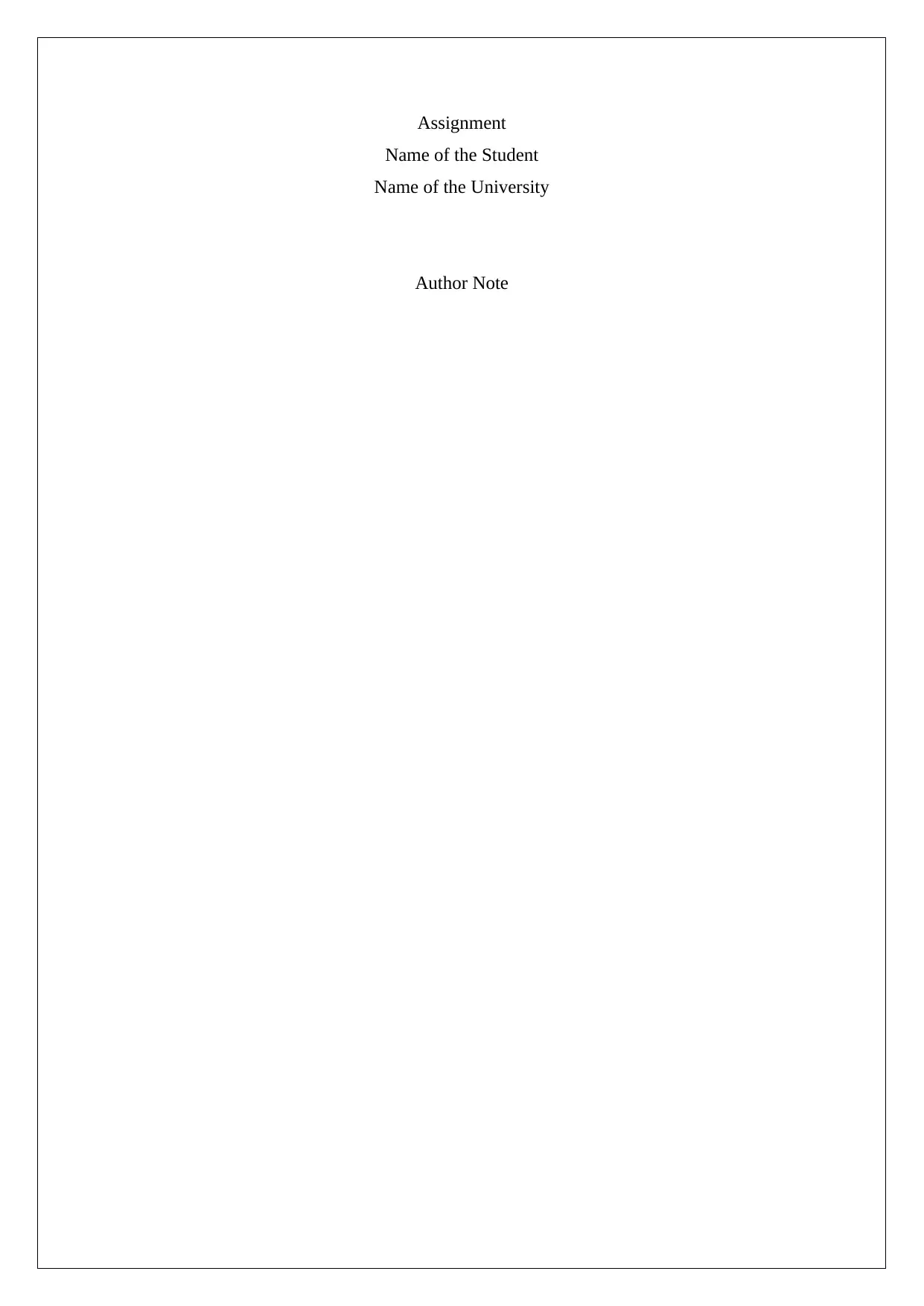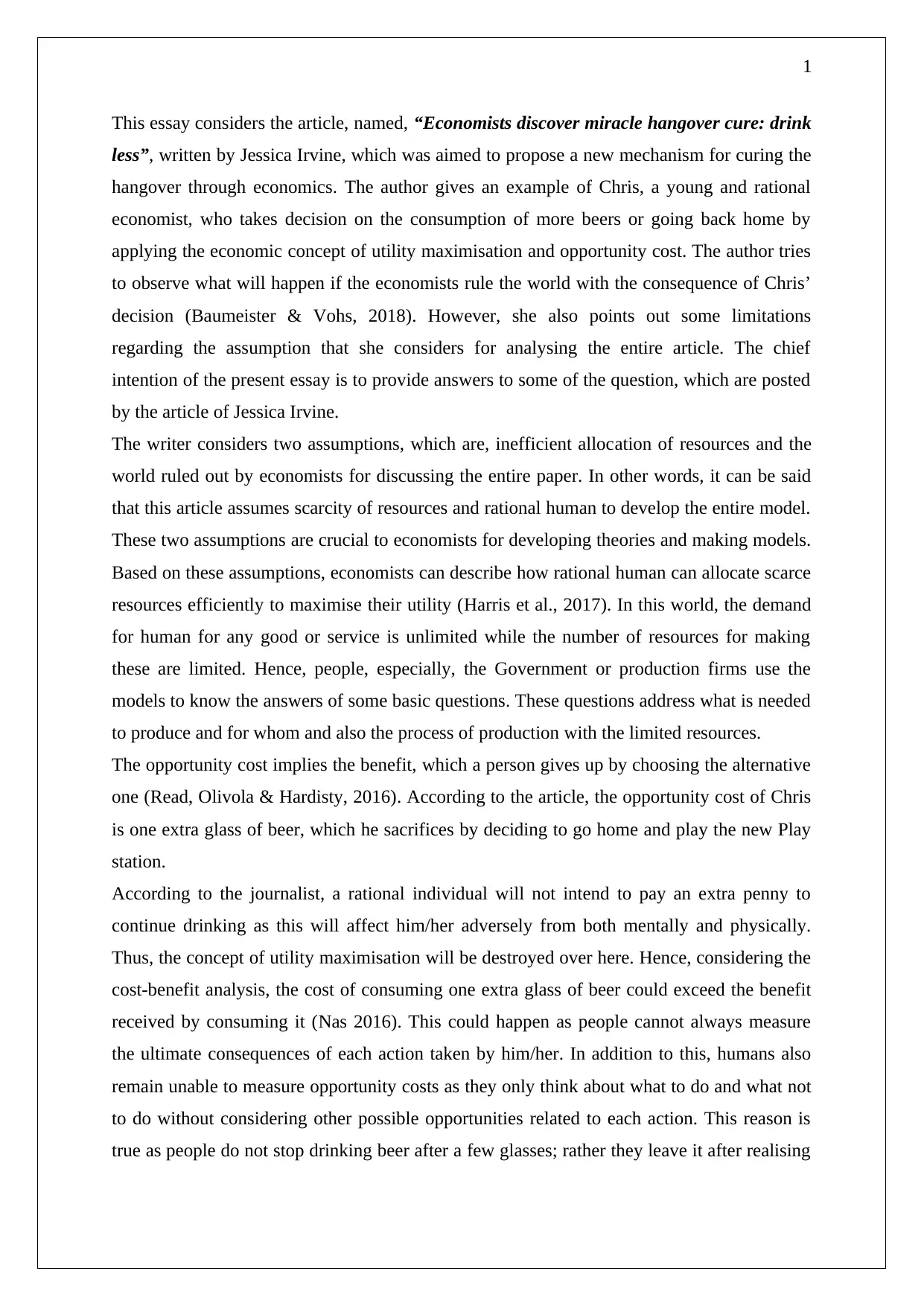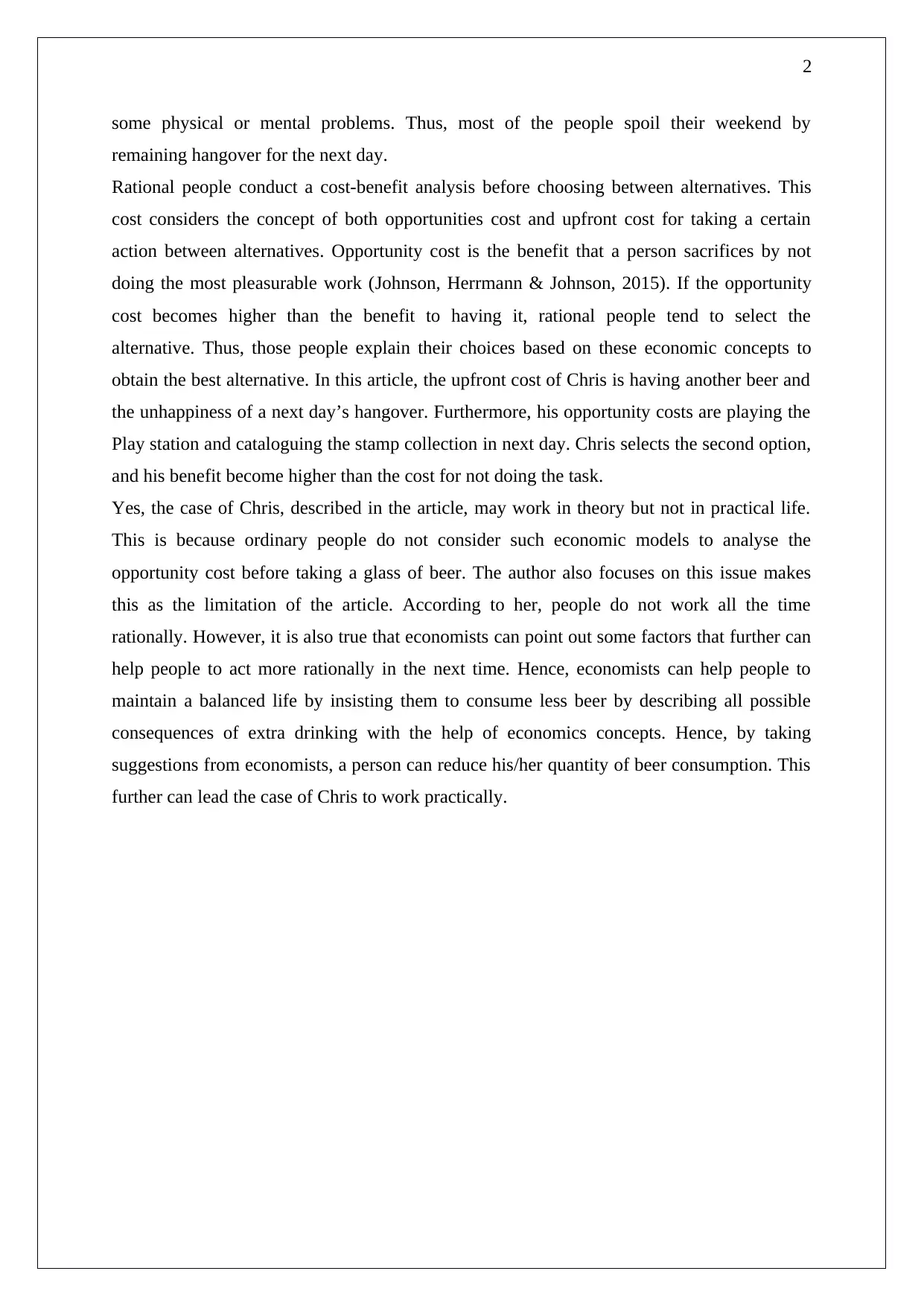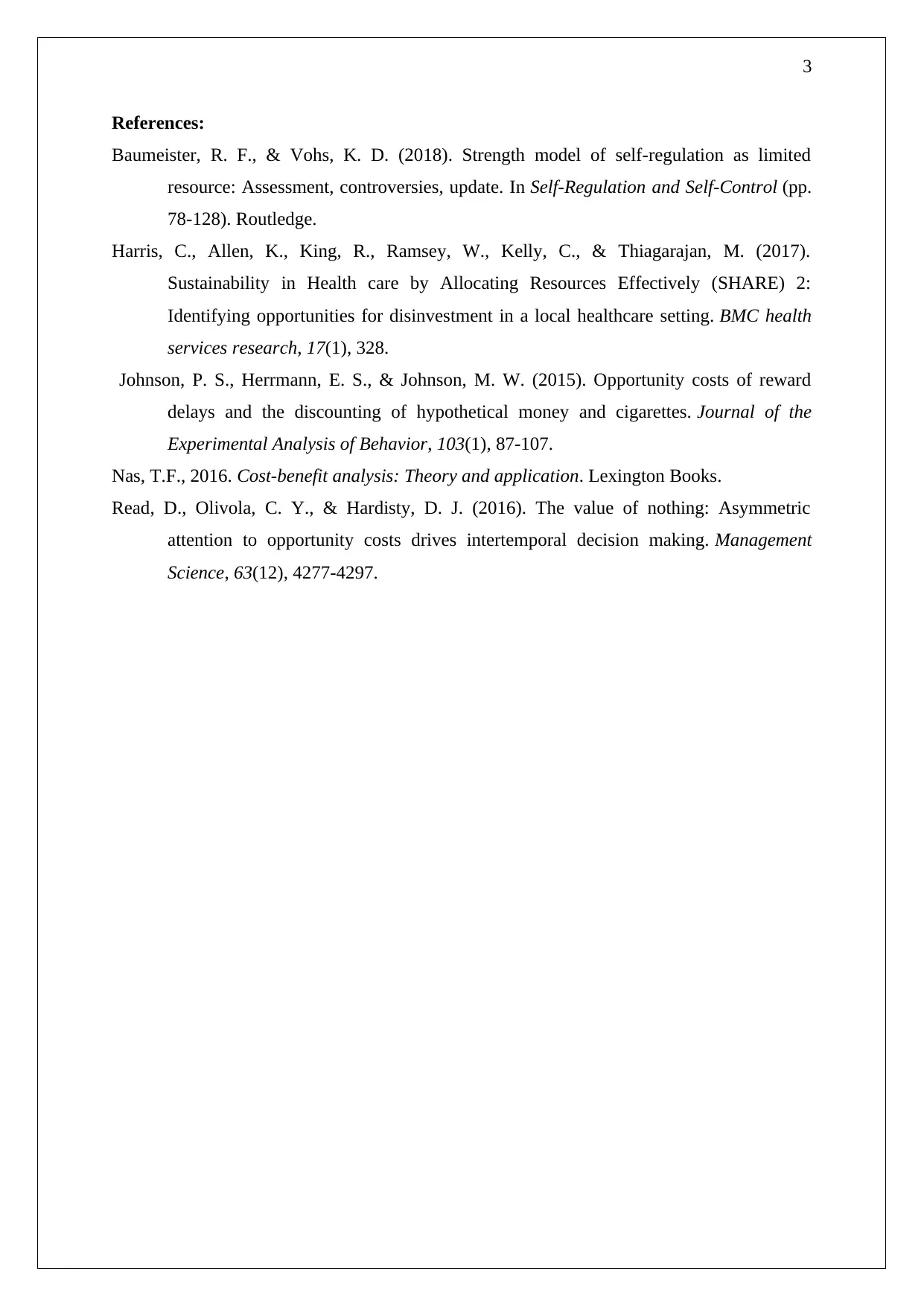University Economics Essay: Hangover Cure Article Analysis, Semester 1
VerifiedAdded on 2022/12/22
|4
|1099
|56
Essay
AI Summary
This essay critically analyzes Jessica Irvine's article, "Economists discover miracle hangover cure: drink less," focusing on the application of economic principles to address the problem of hangovers. The essay examines the author's use of the economic concepts of utility maximization, opportunity cost, and cost-benefit analysis, using the example of 'Chris' to illustrate rational decision-making in consumption. It explores the assumptions of scarcity of resources and rational human behavior, crucial to economic modeling, and discusses the limitations of applying these models to real-world scenarios. The essay assesses whether the theoretical framework presented in the article holds in practice, considering the complexities of human behavior and decision-making, and concludes by highlighting how economists can guide people towards more rational choices regarding consumption and its consequences.

Assignment
Name of the Student
Name of the University
Author Note
Name of the Student
Name of the University
Author Note
Paraphrase This Document
Need a fresh take? Get an instant paraphrase of this document with our AI Paraphraser

1
This essay considers the article, named, “Economists discover miracle hangover cure: drink
less”, written by Jessica Irvine, which was aimed to propose a new mechanism for curing the
hangover through economics. The author gives an example of Chris, a young and rational
economist, who takes decision on the consumption of more beers or going back home by
applying the economic concept of utility maximisation and opportunity cost. The author tries
to observe what will happen if the economists rule the world with the consequence of Chris’
decision (Baumeister & Vohs, 2018). However, she also points out some limitations
regarding the assumption that she considers for analysing the entire article. The chief
intention of the present essay is to provide answers to some of the question, which are posted
by the article of Jessica Irvine.
The writer considers two assumptions, which are, inefficient allocation of resources and the
world ruled out by economists for discussing the entire paper. In other words, it can be said
that this article assumes scarcity of resources and rational human to develop the entire model.
These two assumptions are crucial to economists for developing theories and making models.
Based on these assumptions, economists can describe how rational human can allocate scarce
resources efficiently to maximise their utility (Harris et al., 2017). In this world, the demand
for human for any good or service is unlimited while the number of resources for making
these are limited. Hence, people, especially, the Government or production firms use the
models to know the answers of some basic questions. These questions address what is needed
to produce and for whom and also the process of production with the limited resources.
The opportunity cost implies the benefit, which a person gives up by choosing the alternative
one (Read, Olivola & Hardisty, 2016). According to the article, the opportunity cost of Chris
is one extra glass of beer, which he sacrifices by deciding to go home and play the new Play
station.
According to the journalist, a rational individual will not intend to pay an extra penny to
continue drinking as this will affect him/her adversely from both mentally and physically.
Thus, the concept of utility maximisation will be destroyed over here. Hence, considering the
cost-benefit analysis, the cost of consuming one extra glass of beer could exceed the benefit
received by consuming it (Nas 2016). This could happen as people cannot always measure
the ultimate consequences of each action taken by him/her. In addition to this, humans also
remain unable to measure opportunity costs as they only think about what to do and what not
to do without considering other possible opportunities related to each action. This reason is
true as people do not stop drinking beer after a few glasses; rather they leave it after realising
This essay considers the article, named, “Economists discover miracle hangover cure: drink
less”, written by Jessica Irvine, which was aimed to propose a new mechanism for curing the
hangover through economics. The author gives an example of Chris, a young and rational
economist, who takes decision on the consumption of more beers or going back home by
applying the economic concept of utility maximisation and opportunity cost. The author tries
to observe what will happen if the economists rule the world with the consequence of Chris’
decision (Baumeister & Vohs, 2018). However, she also points out some limitations
regarding the assumption that she considers for analysing the entire article. The chief
intention of the present essay is to provide answers to some of the question, which are posted
by the article of Jessica Irvine.
The writer considers two assumptions, which are, inefficient allocation of resources and the
world ruled out by economists for discussing the entire paper. In other words, it can be said
that this article assumes scarcity of resources and rational human to develop the entire model.
These two assumptions are crucial to economists for developing theories and making models.
Based on these assumptions, economists can describe how rational human can allocate scarce
resources efficiently to maximise their utility (Harris et al., 2017). In this world, the demand
for human for any good or service is unlimited while the number of resources for making
these are limited. Hence, people, especially, the Government or production firms use the
models to know the answers of some basic questions. These questions address what is needed
to produce and for whom and also the process of production with the limited resources.
The opportunity cost implies the benefit, which a person gives up by choosing the alternative
one (Read, Olivola & Hardisty, 2016). According to the article, the opportunity cost of Chris
is one extra glass of beer, which he sacrifices by deciding to go home and play the new Play
station.
According to the journalist, a rational individual will not intend to pay an extra penny to
continue drinking as this will affect him/her adversely from both mentally and physically.
Thus, the concept of utility maximisation will be destroyed over here. Hence, considering the
cost-benefit analysis, the cost of consuming one extra glass of beer could exceed the benefit
received by consuming it (Nas 2016). This could happen as people cannot always measure
the ultimate consequences of each action taken by him/her. In addition to this, humans also
remain unable to measure opportunity costs as they only think about what to do and what not
to do without considering other possible opportunities related to each action. This reason is
true as people do not stop drinking beer after a few glasses; rather they leave it after realising

2
some physical or mental problems. Thus, most of the people spoil their weekend by
remaining hangover for the next day.
Rational people conduct a cost-benefit analysis before choosing between alternatives. This
cost considers the concept of both opportunities cost and upfront cost for taking a certain
action between alternatives. Opportunity cost is the benefit that a person sacrifices by not
doing the most pleasurable work (Johnson, Herrmann & Johnson, 2015). If the opportunity
cost becomes higher than the benefit to having it, rational people tend to select the
alternative. Thus, those people explain their choices based on these economic concepts to
obtain the best alternative. In this article, the upfront cost of Chris is having another beer and
the unhappiness of a next day’s hangover. Furthermore, his opportunity costs are playing the
Play station and cataloguing the stamp collection in next day. Chris selects the second option,
and his benefit become higher than the cost for not doing the task.
Yes, the case of Chris, described in the article, may work in theory but not in practical life.
This is because ordinary people do not consider such economic models to analyse the
opportunity cost before taking a glass of beer. The author also focuses on this issue makes
this as the limitation of the article. According to her, people do not work all the time
rationally. However, it is also true that economists can point out some factors that further can
help people to act more rationally in the next time. Hence, economists can help people to
maintain a balanced life by insisting them to consume less beer by describing all possible
consequences of extra drinking with the help of economics concepts. Hence, by taking
suggestions from economists, a person can reduce his/her quantity of beer consumption. This
further can lead the case of Chris to work practically.
some physical or mental problems. Thus, most of the people spoil their weekend by
remaining hangover for the next day.
Rational people conduct a cost-benefit analysis before choosing between alternatives. This
cost considers the concept of both opportunities cost and upfront cost for taking a certain
action between alternatives. Opportunity cost is the benefit that a person sacrifices by not
doing the most pleasurable work (Johnson, Herrmann & Johnson, 2015). If the opportunity
cost becomes higher than the benefit to having it, rational people tend to select the
alternative. Thus, those people explain their choices based on these economic concepts to
obtain the best alternative. In this article, the upfront cost of Chris is having another beer and
the unhappiness of a next day’s hangover. Furthermore, his opportunity costs are playing the
Play station and cataloguing the stamp collection in next day. Chris selects the second option,
and his benefit become higher than the cost for not doing the task.
Yes, the case of Chris, described in the article, may work in theory but not in practical life.
This is because ordinary people do not consider such economic models to analyse the
opportunity cost before taking a glass of beer. The author also focuses on this issue makes
this as the limitation of the article. According to her, people do not work all the time
rationally. However, it is also true that economists can point out some factors that further can
help people to act more rationally in the next time. Hence, economists can help people to
maintain a balanced life by insisting them to consume less beer by describing all possible
consequences of extra drinking with the help of economics concepts. Hence, by taking
suggestions from economists, a person can reduce his/her quantity of beer consumption. This
further can lead the case of Chris to work practically.
⊘ This is a preview!⊘
Do you want full access?
Subscribe today to unlock all pages.

Trusted by 1+ million students worldwide

3
References:
Baumeister, R. F., & Vohs, K. D. (2018). Strength model of self-regulation as limited
resource: Assessment, controversies, update. In Self-Regulation and Self-Control (pp.
78-128). Routledge.
Harris, C., Allen, K., King, R., Ramsey, W., Kelly, C., & Thiagarajan, M. (2017).
Sustainability in Health care by Allocating Resources Effectively (SHARE) 2:
Identifying opportunities for disinvestment in a local healthcare setting. BMC health
services research, 17(1), 328.
Johnson, P. S., Herrmann, E. S., & Johnson, M. W. (2015). Opportunity costs of reward
delays and the discounting of hypothetical money and cigarettes. Journal of the
Experimental Analysis of Behavior, 103(1), 87-107.
Nas, T.F., 2016. Cost-benefit analysis: Theory and application. Lexington Books.
Read, D., Olivola, C. Y., & Hardisty, D. J. (2016). The value of nothing: Asymmetric
attention to opportunity costs drives intertemporal decision making. Management
Science, 63(12), 4277-4297.
References:
Baumeister, R. F., & Vohs, K. D. (2018). Strength model of self-regulation as limited
resource: Assessment, controversies, update. In Self-Regulation and Self-Control (pp.
78-128). Routledge.
Harris, C., Allen, K., King, R., Ramsey, W., Kelly, C., & Thiagarajan, M. (2017).
Sustainability in Health care by Allocating Resources Effectively (SHARE) 2:
Identifying opportunities for disinvestment in a local healthcare setting. BMC health
services research, 17(1), 328.
Johnson, P. S., Herrmann, E. S., & Johnson, M. W. (2015). Opportunity costs of reward
delays and the discounting of hypothetical money and cigarettes. Journal of the
Experimental Analysis of Behavior, 103(1), 87-107.
Nas, T.F., 2016. Cost-benefit analysis: Theory and application. Lexington Books.
Read, D., Olivola, C. Y., & Hardisty, D. J. (2016). The value of nothing: Asymmetric
attention to opportunity costs drives intertemporal decision making. Management
Science, 63(12), 4277-4297.
1 out of 4
Your All-in-One AI-Powered Toolkit for Academic Success.
+13062052269
info@desklib.com
Available 24*7 on WhatsApp / Email
![[object Object]](/_next/static/media/star-bottom.7253800d.svg)
Unlock your academic potential
Copyright © 2020–2026 A2Z Services. All Rights Reserved. Developed and managed by ZUCOL.


